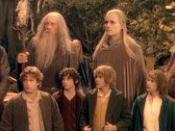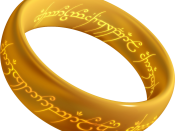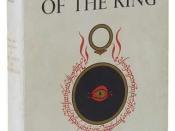All walks of life have within them aspirations and enticement, but only those who manage to resist those siren calls can overcome the inner struggle between what one wants, and what has to be done. In his magnificent novel, The Lord of the Rings: "The Fellowship of the Ring ," J.R.R. Tolkien symbolizes the nature of these two conflicting qualities in the representation of the Hobbits, and the One Ring. The Hobbits symbolize goodness that is associated with the beauty of peace and harmony, and the desire to do no harm. The One Ring is a symbol of persistence, temptation, and ultimately the power of evil . All who come within its presence become tainted, craving to possess it, its power, and its promises. This conflict is personified within the character of the mortal Frodo, and symbolized by the empowering One Ring, which tempts corruption. Frodo struggles within himself to resist the testament of the One Ring, which urges him to take the lenient way out.
The One Ring offers power, protection, and a clash of wills for the bearer. For just as the bearer seeks to use the ring , the ring seeks to dominate the bearer through tempting him with what he desires. If one gives into desire it can only lead to corruption and evil, whereas if the willpower is stronger than the temptation, the good will prevail.
The Ring being presented as a symbol of evil is possibly the most important idea represented in "The Fellowship of the Ring". Inside Tolkien's wonderfully imagined world, evil is the converse of creativity, and is dependent on destruction and failure for its basis. Its very existence, because it contains the evil aspiration of its creator, has the power to tempt, and corrupt. The most notable figures to come under the sway of the Ring in this way are Gollum, and Boromir. Upon first seeing the Ring, Gollum undergoes a transformation from a curious Hobbit, to a greedy murderer. The Ring warps the mind of Gollum, to make his foremost thought the desire to possess the Ring. Gollum's aspiration dwindles to nothing, and he kills his friend without even a thought of what he is doing: '"Give us that, Déagol, my love," said Sméagol, over his friend's shoulder. '"Why?"' said Déagol. '"Because it's my birthday, my love, and I wants it," said Sméagol. '" I don't care," said Déagol. "I have given you a present already, more than I could afford. I found this, and I'm going to keep it." '"Oh, are you indeed, my love" said Sméagol; and he caught Déagol by the throat, and strangled him, because the gold looked so bright and beautiful. Then he put the ring on his finger." (52) Boromir has a temptation to take the ring and try to use it for good ever since he bared his eyes on it at the Council of Elrond. The event that changed Frodo's mind to take the ring himself was when Boromir physically tried to take it from him at Tol Brandir: '"No! no!' cried Frodo. 'The Council laid it upon me to bear it.' 'it is by our own folly that the Enemy will defeat us,' cried Boromir. 'How it angers me! Fool! Obstinate fool! Running willfully to death and ruining our cause. If any mortals have claim to the Ring, it is the men of Numenor, and not Halflings. It is not yours save by unhappy chance. It might have been mine. It should be mine. Give it to me!"' (390) The One Ring acts almost as if it were a separate creature suggesting and tempting the bearer to do things that will either bring the bearer into safety or into harms way. Such as when the Hobbits were at the Prancing Pony and Pippin was entailing a comic account of Bilbo's farewell party. Frodo had to do something quick to make Pippin silent. Frodo then jumped up on a table and began to talk and as a result all of the attention was directed towards him. He felt very foolish and he felt the temptation to slip the Ring over his finger to vanish. He held off the temptation and sang some songs. He then fell of the table and he seemed to vanish at the moment he hit the floor. The Ring some how slipped onto his finger. The Ring wants the bearer to use it. The Ring took him out of the foolish situation but it will attract the evil forces towards him and put him in harms way. Frodo tries his hardest to resist the temptation of the Ring throughout his extraodinary journey; however even the hero can not endure the evil-tempting powers of the Ring: "He did not forget the Barrow, nor the message of Gandalf; but something seemed to be compelling him to disregard all warnings, and he longed to yield. Not with the hope of escape, or of doing anything, either good or band: he simply felt that he must take the Ring and put it on his finger. He could not turn towards him. He shut his eye and struggled for a while; but resistance became unbearable, and at last he slowly drew out the chain, and slipped the Ring on the forefinger of his left hand." (191) The One Ring wants to be noticed so it can be found; therefore being returned to the path of its creator and to resume evil nature that it wants to work.
Within this magical myth, there are many cases where the aspiration of good is stronger than the temptation the the evil One Ring. When Frodo had his first encounter with the Black Riders, he was frightened, and had a strong temptation to put the Ring on to get out of harms way. Frodo must use all of his will to resist giving in to these temptations, and desires. At this point in his journey, Frodo does not realize the dangers that are about and lurking in the shadows. He doesn't know how much power the Ring actually has and what will happen if he wears it: 'A sudden unreasoning fear of discovery laid hold of Frodo, and he thought of his Ring. He hardly dared to breathe, and yet the desire to get it out of his pocket became so strong that he began slowly to move his hand. He felt that he had only to slip in on, and then he would be safe. The advice of Gandalf seemed absurd. Bilbo had to use the Ring. "And I am still in the Shire," he thought, as his hand touched the chain on which it hung. At that moment the rider sat up, and shook the reins. The horse stepped forward, walking slowly at first, and then breaking into a quick trot.' Frodo crawled to the edge of the road and watched the rider, until he dwindled into the distance [...]' (74).
Frodo was able to resist the temptation of the Ring and still be out of harms way. If Frodo suppressed into putting on the Ring, then the Black Rider would have known exactly where he was and would have slain him there where he stood. There are also times when courage comes out at such an enormous strength, Frodo doesn't even think twice about using the Ring to get out of a situation. A beautiful example of this is when Frodo, Sam, Merry, and Pippin are taken by the Barrow-wights: 'Then a wild thought of escape came to him. He wondered if he might put on the Ring, whether the Barrow-wight would miss him, and he might find some way out [...] But the courage that had been awakened in him was now too strong: he could not leave his friends so easily. [...]. Suddenly resolve hardened in him, and he seized a short sword that lay beside him, [...]. With what strength he had he hewed at the crawling arm near the wrist, and the hand broke off [...].' (138) The temptation to use the Ring appeared in Frodo's mind to leave and be safe, but he overcame the temptation with courage and was able to fend off the Barrow-wight long enough to get Tom Bombadil for help. As always, good will always prevail over evil.





